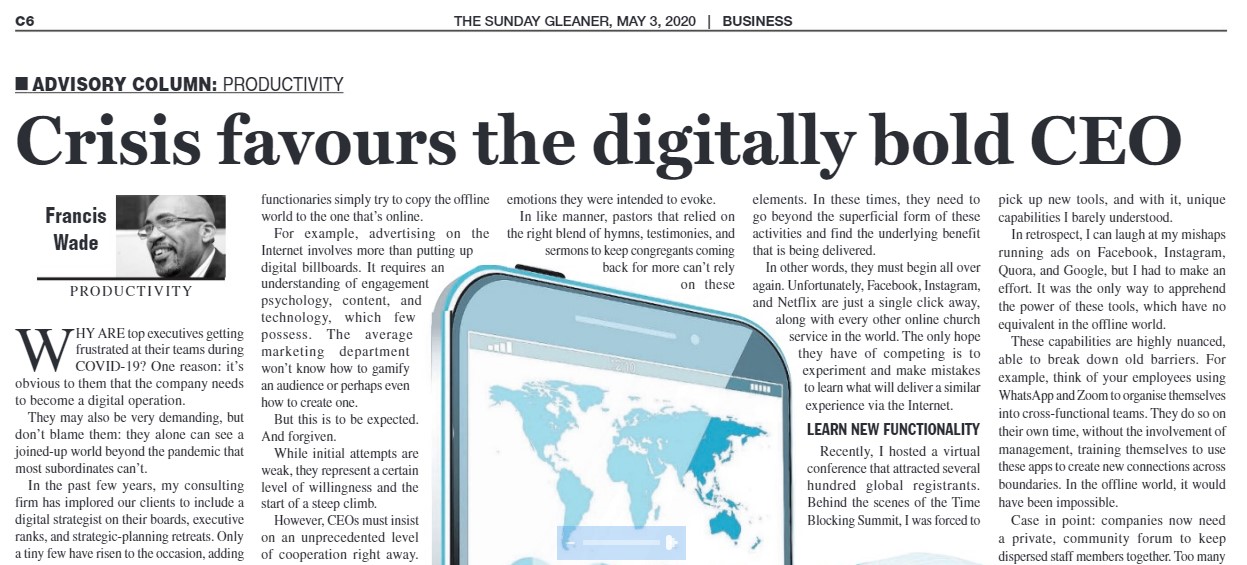Why are top executives getting frustrated at their teams during COVID-19? One reason: it’s obvious to them that the company needs to become a digital operation. They may also be very demanding but don’t blame them: they alone can see a joined-up world beyond the pandemic that most subordinates can’t.
In the past few years, my consulting firm has implored our clients to include a digital strategist on their boards, executive ranks and strategic planning retreats. Only a tiny few have risen to the occasion, adding someone (usually much younger) to strategy discussions, which seemed to be about a faraway future.
COVID-19 has changed the timeline.
As we scan the outputs of prior client retreats we see that the long-term plans they made were painfully slow. They imagined a gradual drift into a digital world where people’s behaviors would change eventually, imperceptibly.
Today, they must make changes to go online from offline in a matter of months. However, CEO’s are having a difficult time getting their executive teams to envision a future that even their youngest employees can see. Why?
In a nutshell, each company function is lost in its own silo. Marketing, HR, Operations, IT…each is unable to lead the way. The new vision is beyond their grasp because it requires joined-up thinking.
What should CEOs’ do to accelerate the process of forging a digital transformation?
1. Forgive Weak Repetition
Many top executives get mad when their functionaries simply try to copy the offline world to the one that’s online.
For example, advertising on the internet involves more than putting up digital billboards. It requires an understanding of engagement psychology, content and technology which few possess. The average marketing department won’t know how to gamify an audience, or perhaps even how to create one.
But this is to be expected. And forgiven.
While initial attempts are weak, they represent a certain level of willingness, and the start of a steep climb. However, CEO’s must insist on an unprecedented level of cooperation right away. They need to role-model an eagerness to cross internal boundaries to discover ideas and talent wherever it may be found. For example, if the new receptionist has 10,000 followers on Instagram, pull her in!
2. Focus on Underlying Business Results
To overcome the initial disappointment, executives should encourage experiments which aren’t meant to replicate old processes, but still achieve the same objectives.
For instance, a company which is used to engaging its walk-in customers in ways that make the experience special, cannot offer the usual free coffee, air-conditioning and relaxed banter. Instead, they must ask themselves why those features worked and what emotions they were intended to evoke.
In like manner, pastors that relied on the right blend of hymns, testimonies and sermons to keep congregants coming back for more can’t rely on these elements. In these times, they need to go beyond the superficial form of these activities and find the underlying benefit that is being delivered.
In other words, they must begin all over again. Unfortunately, Facebook, Instagram and Netflix are just a single click away, along with every other online church service in the world. The only hope they have of competing is to experiment and make mistakes to learn what will deliver the a similar experience via the internet.
3. Learn New Functionality
Recently, I hosted a virtual conference that attracted several hundred global registrants. Behind the scenes of the Time Blocking Summit I was forced to pick up new tools, and with it, unique capabilities I barely understood.
In retrospect, I can laugh at my mishaps running ads on Facebook, Instagram, Quora and Google, but I had to make an effort. It was the only way to apprehend the power of these tools, which have no equivalent in the offline world.
These capabilities are highly nuanced, able to break down old barriers. For example, think of your employees using WhatsApp and Zoom to organize themselves into cross-functional teams. They do so on their own time, without the involvement of management, training themselves to using these apps to create new connections across boundaries. In the offline world, it would have been impossible.
Case in point: companies now need a private, community forum to keep dispersed staff members together. Too many executives, stuck in “Mi nuh use them ting deh” social-media prejudices, can’t lead the charge.
The COVID-19 crisis favors CEOs’ who are willing to push themselves to learn uncomfortable lessons that used to be optional, theoretical or futuristic. Today, they need to be visible role models of learning in order to lead in these extraordinary times.
http://jamaica-gleaner.com/article/business/20200503/francis-wade-crisis-favours-digitally-bold-ceo

